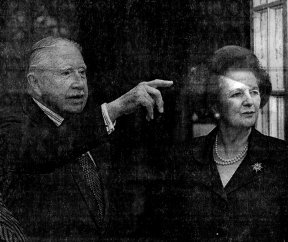It’s pretty easy to make a list of all the important American politicians I have admired over the years. Here it is:
John Kennedy
Bobby Kennedy
Eugene McCarthy
There. That was easy. In spite of the fact that I think the Lewinsky scandal is a partisan farce, I really don’t like Clinton. I don’t think he really does have any principles. And just to make sure we don’t have a misunderstanding here: neither does Bob Dole, Newt Gingrich, Jerry Falwell or Pat Robertson or James Dobson or the entire heavenly host of impeachers, prevaricators, big-spending tax-cutting welfare-reforming conservatives.
Conventional wisdom suggests that John Kennedy remains one of the most admired presidents ever because he didn’t really have a chance to screw things up too badly. He died while he was still young and beautiful. He died before Viet Nam became a festering sore. He died before the 1960’s turned ugly with confrontation and riots and inflation and drugs. He died before Watergate revealed just how ugly government had become. Kennedy, it was observed, was quite capable of the brutal back-stabbing politics practiced by all politicians of his era, including the powerful Senate leader, Lyndon Baines Johnson. So, had he remained in office long enough, some scandal or another would have tarnished his luster.
I don’t agree. John Kennedy had one thing going for him that no other politician of the modern era has had going for him: he was a rationalist.
Let me clarify. Eisenhower was a conservative manager. He had no vision, no grand scheme, no particular passion for where the country was headed. Everything was hunky-dory. Let’s just make sure the bills get paid on time and stay out of trouble. Let’s assassinate or overthrow those pesky dictators in Latin America before they get a chance to destabilize the region. Let’s let the corporations ravish our natural resources, but increase the minimum wage occasionally, so people have enough money to buy their products. Race problems? What’s that?
Nixon, of course, was a megalomaniacal crook. The man was so delusional and Machiavellian that it boggles the mind. The scary thing is that he was, in some ways, like Kennedy. Few people are aware of the fact that Nixon took on the CIA and the FBI. It was such a strange battle that, to this day, nobody knows who won. A DC-10 carrying Howard Hunt’s wife with an attaché case full of documents crashed as it was trying to land at O’Hare airport in Chicago, and scores of FBI agents just happened to have been hanging around together nearby and rushed to the scene to poke through the wreckage. Top officials “committed suicide” or were killed in “hunting accidents”. Nixon was impeached. J. Edgar Hoover died.
Ford was a caretaker bimbo who never belonged in the Oval Office and clearly had no idea of how to manage the machinery of the executive branch. Did you know he served on the Warren Commission? Maybe he wasn’t that dumb after all. Maybe he didn’t mind people thinking he was a bit dumb. By the way, his wife was a stunning beauty in her youth, and was a divorced ex-dancer when he married her on October 15, 1948
Carter was a failure. He was genuinely virtuous, the type of politician electors turn to after a major scandal (Watergate), and he was disadvantaged by the inflationary pressures left by Nixon and the Viet Nam War. He made a fatal mistake: he was elected for his virtue, but tried to be re-elected for his vice. He allowed the Shah of Iran to fall, which was probably the right thing to do, but then he welcomed the Shah to the U.S. for medical treatment– a major blunder. You have to give some of the blame to American intelligence here– were they really that stupid? Or was this another example of the intelligence services wagging the dog? He was also apparently guilty of trying to micro-manage the presidency, at one point even personally approving schedules for the White House tennis courts. I think he was a decent man who was elected, partly, by accident.
Reagan was not very bright. He simply brought in his ideological allies and let them run things and then covered for them. He is sometimes credited with bringing the Soviet Empire down by threatening to outspend them to death on military hardware, but this argument is given as if Democratic presidents have been any less hawkish on defense than Republican presidents. If Clinton or Carter are examples (and they are the only ones), this is obviously untrue. Furthermore, Gorbachaev is obviously the man who really brought down the Soviet Empire. Reagan’s supporters always act as if Reagan talked him into it.
Bush never did get a grasp on leadership. What did he stand for in the end? Pragmatism, with a hall-pass to the right-wingers.
So we’re back to Kennedy. Kennedy used his devious political skills and his father’s money to get into office. Once he was elected, however, he seemed to rise above partisan political measures more than any president since Franklin Roosevelt. His progression on Viet Nam is fascinating, because we all know about the disaster that followed. He initially supported U.S. involvement, but as it became more and more clear that South Viet Nam was not politically stable, nor organized on sound cultural or economic foundations, he expressed growing skepticism. It was clear that he was contemplating a significant change in policy in the weeks leading up to his assassination.
Perhaps his boldest stroke was the controversial appointment of his brother, Bobby Kennedy, as attorney-general. Bobby didn’t want it. The New York Times lambasted the move as nepotism. Jack insisted because, he said, he wanted someone in his cabinet who would not be afraid to give him the unvarnished truth about any issue. Then he joked about giving Bobby some experience before he goes into private practice.
Bobby Kennedy, whatever you think of his politics or personality, was, without a doubt, the most incorruptible politician of the 1960’s. This became clear almost immediately when he set about indicting, prosecuting, and convicting a family friend with connections to the mob. John wasn’t completely sold on the idea, but did not interfere, which tells you a wealth of things about John’s character as well.
Bobby Kennedy found out that Sam Giancalana, a known mobster, was being recruited by the CIA to assassinate Fidel Castro. He was so outraged, he personally undertook the prosecution and conviction of Giancalana for offenses connected with his casino operations in Las Vegas. Then he cancelled Jack’s visit to Frank Sinatra’s spread because Sinatra had hosted another mob associate just a few months before the scheduled visit. He personally broke the back of organized crime in the U.S., while J. Edgar Hoover sat in his little pleasure palace in Washington and solemnly declared that there was no organized crime in the U.S., while tapping Martin Luther King Jr.’s telephones.
In fairness, some critics believe that Bobby initially approved of the plans to assassinate Castro. I’m not sure that’s not true, but almost everybody agrees that he and John both had misgivings about the idea.
I’m not a conspiracy “buff” in reference to John Kennedy’s assassination. Too many of the books on the subject start to sound hysterically paranoid after a while. The ones that propose that the conspirators somehow altered the body before the autopsy, or that four, five, or more shooters were present in Dealy Plaza, or that there was a duplicate Oswald, and so on and so on, evoke the term “crackpot”.
But I find it really difficult to believe that the complex web of relationships between Oswald and various CIA, Cuban, and underworld figures was merely coincidental.
Defenders of the Warren Report want it both ways. They want to argue that Oswald was a “lone nut” who just happened to have the inclination and opportunity at the same time. Then they want you to believe that this particular “lone nut”– this random confluence of willfulness, egotism, and psychosis– just happened to be be acquainted with David Ferrie and George de Mohrenschildt.
And is it a coincidence that the wounding of George Wallace during another assassination attempt benefited Nixon enormously? I doubt that Nixon himself was involved in any kind of murder plot, but he didn’t have to be. He merely had to make clear his pro-military, pro-intelligence community, pro-business political views.
It is also hard to believe that the Warren Commission had any purpose other than to convince Americans that everything in Washington was hunky-dory now and you can all just calm down and go back to sleep for another ten years. When their explanation of a single, lone, “crazed” gunman ran into a minor obstacle– the physical evidence pointed to at least one other gunman– they simply revised the evidence. They weren’t investigating the facts. They were constructing a case for a pre-ordained conclusion.
Anyone aware of Bobby Kennedy’s tenure as Attorney General would have reason to think that President Robert Kennedy would have represented a grave threat to various powerful, vested interests in Washington, including the intelligence communities and organized crime. His assassination did not, as it appears on the surface, merely guarantee the election of Hubert Humphrey as the Democratic candidate for president in 1968. It guaranteed the election of Richard Nixon as President, for Kennedy, or possibly Eugene McCarthy, were the only Democrats who could have beat him.
Look who followed: Nixon, Ford, Carter, Reagan, Clinton. A pretty pathetic lot, all of them.


